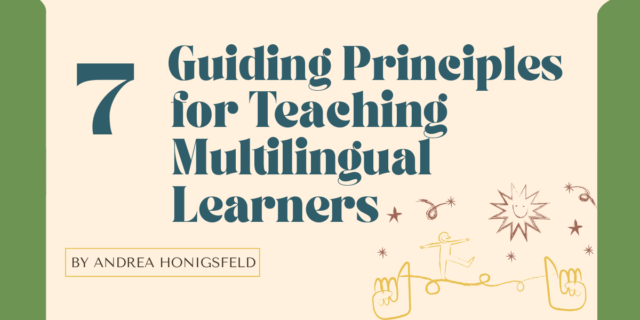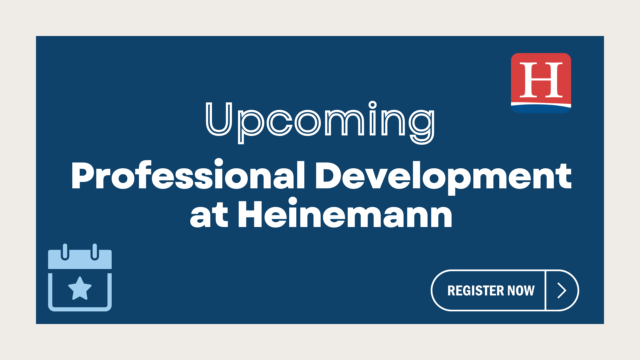
Teaching is a profession that elicits a myriad of questions throughout the day, from the rhetorical to pedagogical. Finding intellectual space to ponder these questions in a way that will impact practice can be tough, and we want to help. Our new series, “In The Quiet: Reflections on Learning” invites you into the mind of an expert in the field through a brief Q&A. So, wherever your quiet is—after the bell, on the commute, or elsewhere—please enjoy this space to reflect as you hone your craft.
Lindsey Moses is a former elementary teacher and associate professor of literacy education at Arizona State University. She works with classroom teachers around the country supporting the implementation of effective literacy instruction in diverse settings. In this post, we get to hear her perspective on teaching students who are learning English.
![]()
What does research tell us that multilingual learners need the most as they develop literacy in their new language?
![]()
While multilingual learners all have the process of learning more than one language in common, they are a unique group of individuals. Like any group of learners, they have different backgrounds, beliefs, preferences, personalities, knowledge bases, needs, and strengths. Teachers can support these strengths by providing culturally and linguistically sustaining instruction and assessment (Paris 2012). This involves teachers recognizing, responding to, and validating students’ cultural practices through multimodal and multilingual learning opportunities. Research shows that multilingual learners benefit from instruction that involves meaningful content-rich activities that encourage language growth through engagement, discussion, and co-creation of academic products (Hakuta and Santos 2012, iii).
![]()
What is the difference between a scaffold and strategy?
![]()
Scaffolding has long been discussed in relation to Vygotsky’s Zone of Proximal Development (ZPD) because he argued that learning takes place when teacher/adult/mentor support is needed. It is in this zone that students learn and move toward independence, thanks to the assistance, or what Wood, Bruner, and Ross (1976) referred to as scaffolding, from knowledgeable others (typically adults). At the core of this work is the idea that instead of simplifying the task for the child, we should adjust the scaffold that is being provided to support learners in accomplishing this task initially with the scaffolds and then eventually on their own without scaffolds. Originally, this work and research was focused specifically on monolingual speakers but has more recently been taken up to focus on supporting multilingual learners (Cummins 2000, Gibbons 2002, 2009, Krashen 2003, WIDA 2017, etc.).
People use the terms scaffold and strategy in many different ways. In my recent work, I am using the term scaffold to represent the broad category of a type of scaffold/support. For example, August, Fenner, & Snyder (2014), Goldenberg (2013), and other researchers have identified the scaffold of using visuals to support understanding as being highly effective for supporting multilingual students. Within the scaffold of using visuals to support understanding, there are countless instructional strategies that teachers could use such as: (1) Use pictures and realia to introduce vocabulary and build background about a new topic; (2) Provide emergent speakers with an image bank to respond to questions and participate in discussion; (3) Incorporate video with closed captioning to support and reinforce concepts, etc.
![]()
What myth about multilingual learners do you most want to bust, and what truth would you like to replace it with?
![]()
Myth: “Parents should be reading and speaking to their children in English at home.”
Truth: Parents should be reading and speaking with their children in their home language. Bilingualism carries so many benefits, and the last thing we want to happen is for children to miss out on opportunities to engage with and communicate in their home language. All of the language and literacy building experiences we recommend, such as telling stories, reading books, singing songs, making lists, writing letters, etc., can and should be done with their parents in their home language. Growing and developing in one language does not hinder progress of learning another!
![]()
As a learner, what professional learning experience has had the most positive impact on your teaching career?
![]()
Getting to spend time watching, collaborating with, and co-teaching with other educators has had the most positive impact on my teaching career. I love reading research and pedagogy books and articles, but there is nothing like learning in collaboration with other educators. I feel very lucky that I get to constantly learn alongside teachers and schools thinking about how they can expand their instructional knowledge and practice in relation to supporting language and literacy for multilingual learners. Building on that work and as part of my job at the university, I conduct research to see what is working and what isn’t in a specific context. I can then use the research as a professional learning experience to inform and adjust my instruction in ways that might better support multilingual learners.
Please also see the related blog, Reflections on Learning: More Support for Multilingual Learners, for additional content.


